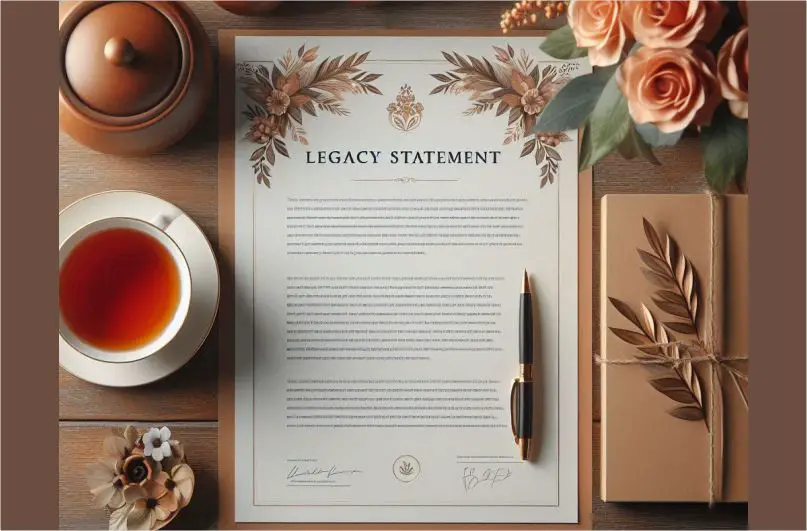What is a legacy statement and letter? Powerful ways to share your legacy and impact, beliefs, and experiences with future generations.
Far from a list of accomplishments, they are personal reflection on what you want to leave behind, like life lessons, family traditions, and core philosophies.
One popular form of legacy statement is a legacy letter, a heartfelt letter to loved ones that communicates your wisdom and philosophy.
Whether you choose a written letter, a digital message, or another form, creating a legacy statement helps you ensure that your story lives on.
In this guide, we’ll explore different types of legacy statements, including examples of legacy letters, and give you the tools to write one that captures what truly matters to you.
Key Takeaways:
- Legacy statements preserve personal values, beliefs, and life lessons for future generations to inspire and guide them.
- They strengthen emotional bonds by expressing love, gratitude, and personal reflections, creating lasting impacts on relationships.
- Legacy letters can offer comfort, forgiveness and closure, providing words of wisdom and encouragement during difficult times.
- A legacy letter shares wisdom and life lessons, providing guidance for future generations.
- Writing personalized letters helps preserve family history and strengthens emotional bonds.
What is a Legacy Statement?
A legacy statement is a personal reflection where you share your core values, beliefs, and the impact you want to leave for future generations. It’s a way for you to express what’s important to you and the lessons you’ve learned throughout life.
Whether it’s for your family, friends, or colleagues, a legacy statement helps others understand the principles that have shaped your choices and actions.
By sharing your vision, it can guide others in their own decisions and actions, keeping your values alive.
A legacy statement is a meaningful way to pass on wisdom and ensure your beliefs continue to inspire others.
Recommended: What is Professional Legacy?
The Importance of Legacy Statements
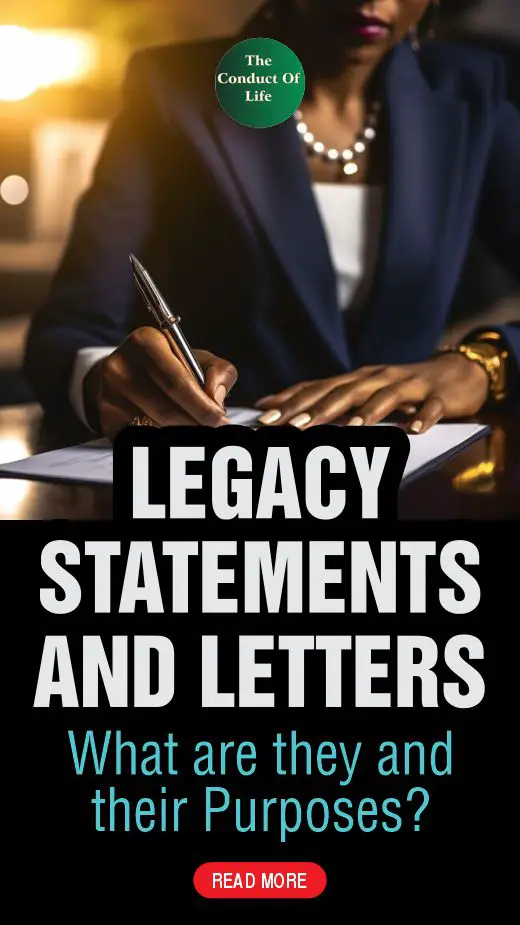
Legacy statements and letters serve as meaningful tools for preserving values, sharing life experiences, and passing on wisdom. Here are five key reasons why they are important:
- Preserving Family History and Traditions: Legacy letters provide an opportunity to pass down family stories, traditions, and values, ensuring future generations remain connected to their roots.
- Providing Guidance and Wisdom: These statements offer invaluable life lessons, advice, and personal insights that can guide loved ones through difficult times or major life decisions.
- Strengthening Emotional Bonds: A well-written legacy letter can deepen emotional connections, especially if it expresses love, gratitude, and pride for the family, helping to create a lasting impact on relationships.
- Offering Comfort and Closure: After a loved one’s passing, a letter of legacy can provide comfort, offering words of encouragement, personal reflections, and final wishes that ease the grieving process.
- Leaving a Personal Mark: A legacy statement gives individuals the chance to define how they want to be remembered, sharing their values, goals, and intentions for their legacy, which can inspire others.
Legacy Statement Template
A well-structured legacy statement template can facilitate reflection and help you clarify your values, beliefs, and aspirations.
Below is a basic template with prompts and guiding questions designed to aid in the development of your legacy statement.
1. Introduction
Begin by outlining your purpose. What do you hope to achieve with this legacy statement?
Consider how your values and principles shape the legacy you wish to leave. Write a few sentences addressing your motivations.
2. Personal Reflection
What defining moments in your life have shaped who you are today? List three significant experiences and analyze how they influence your outlook on life and legacy.
3. Core Values and Beliefs
Identify your core values. What principles are non-negotiable in your life? Consider how these values will guide your actions and decisions. Write a brief paragraph summarizing these elements.
4. Vision for the Future
Describe the impact you want to have on your loved ones, community, or profession. What characteristics do you want people to remember about you? Use this opportunity to articulate your goals.
5. Inspirational Quotes or Wisdom
Incorporate quotes or wisdom from influential figures that resonate with you. These can reflect your beliefs and serve as motivational reminders.
6. Legacy Letters
Consider writing letters to specific individuals in your life. What messages or life lessons would you like to communicate to family members or friends? This can provide a personal touch to your legacy statement.
7. Conclusion
Finally, summarize the essence of your legacy statement. What do you wish readers to remember most about you? This section serves as a culmination of your thoughts and reflections.
Utilize this legacy statement template as a foundation for your writing. By carefully reflecting on each section, you will be able to create a comprehensive and meaningful legacy statement that captures your values and aspirations for the future.
Related: How to Measure the Impact of Your Legacy
Types of Legacy Statements

Legacy statements can take various forms, catering to different audiences and purposes.
Understanding the different types can help your articulate your messages more effectively, whether for personal introspection or public communication.
1. Written Legacy Statements
These are typically written documents that detail your values, experiences, beliefs, and life lessons.
They may be in the form of letters, essays, or personal reflections that provide guidance and wisdom for future generations.
2. Ethical Wills
This type of legacy statement focuses on sharing your moral and ethical values.
It’s often written to convey what you believe is important in life, such as spiritual beliefs, personal philosophies, and guidance on how to live with integrity.
3. Legacy Letters
A legacy letter is a specific form of written legacy statement, often directed at loved ones.
These letters express personal reflections, advice, and life lessons you want to pass on, making them deeply personal and meaningful.
Legacy letters are often heartfelt and intimate, focusing on the emotional connections you share with your recipients. More on this later in this article.
4. Audio or Video Legacy Statements
Some people choose to leave behind an audio or video recording of their thoughts, making their legacy statement more personal and accessible.
This type captures the tone of your voice, adding an emotional and human element that written words alone may not convey.
Related: What Happens to Your Online Activities at Your Death?
5. Digital Legacy Statements
As digital technology advances, many individuals are now creating legacy statements through online platforms, such as blogs, social media profiles, or digital storage (e.g., Google Docs).
These can be a mix of text, images, and even videos to showcase your legacy for future generations.
6. Artistic Legacy Statements
For those who are creative, an artistic legacy statement might include works of art, music, poetry, or other forms of creative expression that communicate values, life experiences, or reflections on the world.
7. Financial or Business Legacy Statements
These statements focus on passing down financial wisdom, investments, business strategies, or the history of a family business.
They can serve as guides for managing wealth or continuing a family legacy within business or entrepreneurship.
8. Personal or Family History Legacy Statements
This type involves sharing family history, traditions, and the stories of your ancestors.
It helps preserve the family’s story, often passed down to younger generations to ensure they understand and appreciate their roots.
Recommended: Guide on Building Philanthropic Legacy
Legacy Statement Examples
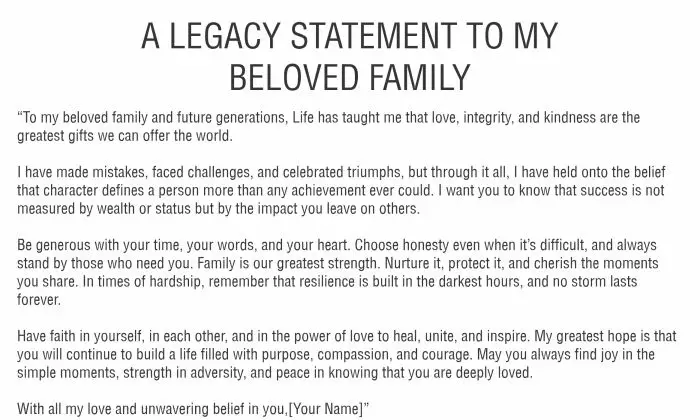
Here are several legacy statement examples, each showcasing different aspects of a person’s life, values, and impact:
1. Personal Legacy Statement
A personal legacy statement focuses on your personal life, values, and relationships.
It may include reflections on family, love, kindness, and life’s lessons. For instance, you might write about how you raised your children to value integrity and the importance of family traditions.
It’s a way to share personal experiences and advice for future generations to carry forward.
2. Leadership Legacy Statement
A leadership legacy statement is aimed at sharing the values and principles that guided you in your leadership roles.
This type of statement may highlight professional achievements, ethical decision-making, and the impact of leadership on others.
As a leader, you might write about how you prioritized honesty, teamwork, and innovation in your career, ensuring these principles would influence the future of your organization.
3. Professional Legacy Statement
A professional legacy statement focuses on career accomplishments and the contributions made to one’s field.
This could include reflections on milestones achieved, challenges overcome, and the impact you have had on colleagues, clients, or the industry at large.
For example, a business executive may write about how their leadership transformed a company’s culture and the principles that guided their business decisions.
Community Legacy Statement
A community legacy statement is centered on a person’s contribution to their community.
This can include volunteer work, activism, and social responsibility. For example, someone might reflect on their work with local charities or efforts to improve environmental sustainability.
This type of statement helps convey the lasting change someone wishes to create within their community.
Philanthropic Legacy Statement
A philanthropic legacy statement highlights your charitable giving and the causes you supported throughout your life.
This could involve sharing your motivations behind donations, efforts to raise awareness, or establishing foundations.
It helps others understand the importance of philanthropy in your life and inspires future generations to continue supporting similar causes.
Spiritual or Faith-Based Legacy Statement
This type of statement reflects your spiritual beliefs and how those beliefs shaped your life.
It may include reflections on faith, personal growth and development, and how you lived according to your spiritual values.
A religious leader might write about how their faith guided their decisions, focusing on compassion, service to others, and a commitment to love and understanding.
Family Legacy Statement
A family legacy statement is often written to share family values, traditions, and memories with future generations.
It could include family history, stories, and the lessons learned through the generations.
For example, you may write about your ancestors’ struggles and triumphs, offering advice for future generations on how to uphold family traditions and values.
Further Reading: How do You Create Cultural Legacy?
How to Write a Legacy Statement

Writing your is a chance to articulate how you want to be remembered and what you want to leave behind.
Here’s a simple guide to help you get started.
Step 1: Reflect on Your Life and Values
Think about the key moments in your life and the lessons they’ve taught you.
What principles have shaped your decisions? These core values will form the foundation of your legacy statement, so take time to identify them clearly.
Step 2: Organize Your Thoughts
Structure your legacy statement to keep your message clear. Start with an introduction about who you are and what matters most to you.
Then, share specific examples of life events or achievements that reflect your values, like family milestones or career accomplishments.
Step 3: Be Authentic and Genuine
Write in a tone that feels true to you. The more honest and relatable you are, the more your statement will resonate with readers. Keep it concise—one or two pages should be enough to express your message clearly.
Step 4: Use a Template for Guidance
If you’re unsure where to begin, a legacy statement template can help you structure your thoughts.
Focus on your message, and let the template guide you through the writing process. Once you’ve drafted your statement, revise it for clarity and flow.
Step 5: Get Feedback
Before finalizing your legacy statement, ask a trusted friend or family member to review it.
Their feedback can offer valuable perspective and help ensure your statement truly reflects your values and intentions.
What is a Legacy Letter and How Do You Write One?
What are Legacy Letters?
A legacy letter, also known as an ethical will, or heritage letter is a written message where you share life lessons, values, and memories with your loved ones.
Unlike a will, which focuses on distributing assets, a legacy letter passes down wisdom, advice, and cherished experiences.
It’s a personal document that can reflect on key life events or offer guidance on navigating challenges.
Whether writing to a child, grandchild, or family member, it allows you to preserve your essence for future generations.
Though informal, letters of legacy strengthen family bonds and leave a lasting emotional impact that goes beyond material wealth.
Types of Legacy Letters
Depending on your intent and audience, these letters come in several forms, catering to many purposes as you will see:
General Legacy Letters
A general legacy letter reflects on your life experiences and the wisdom you’ve gained.
It can offer guidance on themes like love, resilience, and overcoming challenges.
Often shared with family and friends, it serves as a timeless reminder of your values for future generations.
Personalized Legacy Letters
These letters are written specifically for one person, like a child or grandchild.
Addressed to your son, this letter might include personal stories and advice that shape his identity.
For grandchildren, you might focus on family traditions and wisdom you hope they carry forward.
These letters are deeply personal and help build stronger emotional connections.
Specialized Legacy Letters
Some heritage letters serve specific purposes. A spiritual legacy letter might share your faith and practices with the next generation, while a career-focused letter could provide insights into your professional journey.
These letters are designed to guide recipients in areas important to you, ensuring they carry your wisdom in specific aspects of life.
Why You Should Write a Legacy Letter
Writing a letter of legacy lets you share your values, life lessons, and cherished memories, creating a meaningful connection with your loved ones that can last across generations.
- Finding Closure: A heritage letter provides closure by offering comfort through wisdom and insights. It helps family members deal with grief while reflecting on your values, guiding them through life’s challenges.
- Leaving Behind Your Story: By writing a legacy letter, you document your personal journey, preserving your experiences and lessons for future generations. This letter becomes a lasting reminder of who you were.
How to Write a Legacy Letter
Writing an ethical will or letter is a personal way to share your life lessons, beliefs, and stories with your loved ones.
Here’s how to craft one that will stand the test of time.
- Define Your Purpose: Decide what message you want to communicate, whether it’s advice, wisdom, or personal stories. This helps focus your letter.
- Choose Your Audience: Determine who will read your letter and tailor it to their experiences and needs to make it more meaningful.
- Organize Your Thoughts: List important life events, values, and lessons. This helps structure your letter and ensures you include key insights.
- Be Authentic: Write honestly and from the heart, sharing your true thoughts. This creates a personal connection with your reader.
- Seek Inspiration: If you’re unsure, read legacy letter examples. They can spark ideas and help express your thoughts effectively.
Legacy Letter to My Son/Daughter
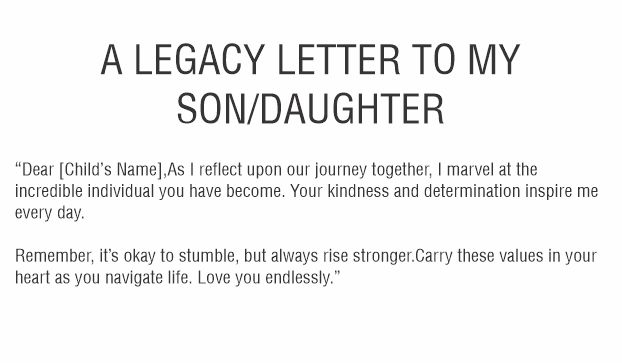
Writing a legacy letter to your child is a special way to share your love, values, and hopes for their future.
This letter will become a keepsake they can cherish for years. Here’s how to craft a meaningful message just for them.
Reflect on Milestones
Start by thinking about the milestones your child has reached. Talk about their first steps, big school achievements, or moments when they overcame challenges.
These memories help connect your bond and reinforce the values you want them to remember.
For example, if they showed kindness, share that story to show them how much you value empathy.
Offer Life Advice
Include practical advice based on your own experiences. Share your thoughts on resilience, honesty, or the importance of education.
Explain these values with personal examples to make them more relatable.
You can use an ethical will letter template for this, which can help you organize these lessons in a way your child will understand and appreciate.
Express Your Hopes for the Future
Talk about your hopes for your child’s future. Whether it’s following their dreams or building meaningful relationships, let them know you’ll support them. Sharing your own dreams can inspire them to pursue their passions fearlessly.
End With Love
End the letter with heartfelt words that show your love and belief in their potential.
This letter won’t just guide them, but it will also serve as a reminder of your unwavering support for their future.
Legacy Letter to Family
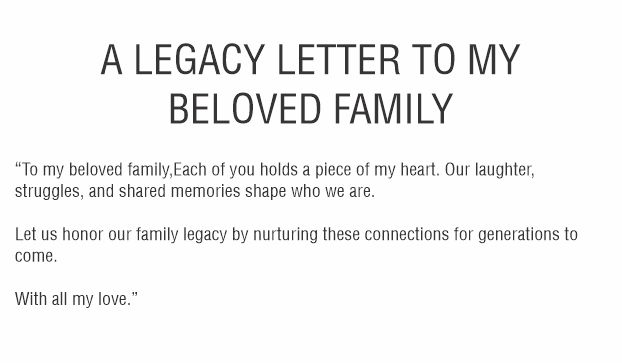
Writing a heritage letter to your family is a meaningful way to share your beliefs, experiences, and values.
This letter can serve as a reminder of what matters most to you, providing future generations with a glimpse into your life and guiding them along the way.
- Reflect on Family Traditions: Think about your family’s customs and values, sharing stories that bring those traditions to life.
- Share Your Lessons and Advice: Offer personal advice based on your experiences, focusing on wisdom, love, and guidance for future generations.
- Structure Your Letter: Start with a greeting, share family history, and include life lessons and advice in a conversational tone.
- Find Inspiration: Use legacy letter examples to inspire your own writing and express your thoughts more effectively.
Legacy Letter to Grandchildren
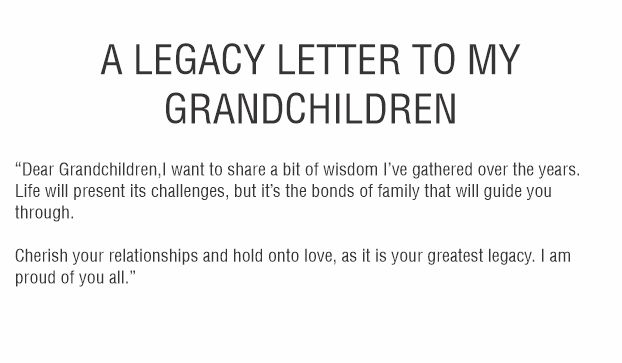
A legacy letter directed to your grandchildren is a special way to pass down your wisdom, values, and hopes for their future.
It’s not just a letter, it’s a keepsake they can hold on to for years.
- Share Life Lessons and Values: Pass down important life lessons and values, using personal stories to guide your grandchildren through life’s challenges.
- Highlight Family History and Traditions: Recount family stories and traditions to help your grandchildren connect with their roots and understand the importance of family.
- Express Hopes for Their Future: Share your hopes for your grandchildren’s future, encouraging them to follow their passions and embrace opportunities for growth.
- Create a Heartfelt Keepsake: Write a meaningful letter filled with love, wisdom, and guidance that your grandchildren can cherish for years to come.
How to Write a Legacy Letter: A Step-by-Step Guide
Writing a legacy letter is a powerful way to share your thoughts, values, and memories with the people you care about.
Here’s a simple guide to help you create a letter that will be treasured for generations.
Start with a Personal Introduction
Kick off your letter with a direct and personal greeting. Address the recipient by name, like “Dear Chims” or “To my cherished grandchildren.”
This sets a warm tone and shows that this letter is meant specifically for them.
Share Your Values and Life Lessons
Dive into the heart of your message by talking about your core values and life lessons.
Reflect on the principles that shaped you, like kindness, hard work, or perseverance.
Explain why these values are important to you and how they’ve guided your decisions throughout life.
Reflect on Family History
Consider sharing stories from your past or your family’s history. These anecdotes could be about significant events, traditions, or memories that define your family. By doing so, you help your loved ones understand where they come from and feel connected to their roots.
Include Personal Stories and Experiences
Personal anecdotes are key to making your letter meaningful. Share moments that shaped your life, such as challenges you’ve overcome, important achievements, or lessons learned from others.
These stories will not only make your letter more personal but also inspire your loved ones.
End with a Heartfelt Closing
Conclude by reaffirming your love and support. You can express your hopes for their future, wishing them happiness or success.
A heartfelt sign-off, like “With love” or “Always here for you,” will leave a lasting impression.
Legacy Letter Examples and Templates
Below are three varied examples of legacy letters tailored for specific recipients, illustrating how to write a legacy letter that resonates with its intended audience.
The first example is a heartfelt letter to a son or daughter. In this letter, a parent expresses gratitude for the moments shared and highlights the traits they admire in their child.
The letter encapsulates lessons learned from life experiences and encourages the child to pursue their passions while remaining grounded in family values.
For instance:
“Dear [Child’s Name],
As I reflect upon our journey together, I marvel at the incredible individual you have become.
Your kindness and determination inspire me every day. Remember, it’s okay to stumble, but always rise stronger.
Carry these values in your heart as you navigate life. Love you endlessly.”
Next, we have a wisdom-sharing letter for grandchildren. This legacy letter aims to share insights about coping with adversity and the importance of maintaining strong family ties. It could read:
“Dear Grandchildren,
I want to share a bit of wisdom I’ve gathered over the years. Life will present its challenges, but it’s the bonds of family that will guide you through. Cherish your relationships and hold onto love, as it is your greatest legacy. I am proud of you all.”
Lastly, a family-inclusive legacy message addresses the significance of unity and shared memories. This can reinforce family traditions and values. An example might be:
“To my beloved family,
Each of you holds a piece of my heart. Our laughter, struggles, and shared memories shape who we are. Let us honor our family legacy by nurturing these connections for generations to come.
With all my love.”
These legacy letter examples illustrate the diverse approaches you can take when writing; from personal reflections to collective family wisdom, a successful letter will engage with its recipients meaningfully.
An effective legacy letter can be a treasured keepsake for loved ones, serving as a reminder of the relationships that bind us together.
The Lasting Impact of a Legacy Letter
A legacy letter is more than just words; it strengthens emotional connections and preserves family values and histories.
It serves as a bridge between generations, offering comfort, guidance, and a sense of belonging.
These letters can heal by creating an understanding and empathy, especially in families facing misunderstandings or emotional distance.
By sharing personal stories, life lessons, and values, they help create a sense of unity and connection.
Reading a legacy letter often brings families closer, encouraging forgiveness and reflection.
Ultimately, these letters leave a lasting impact, shaping future generations with love, wisdom, and a deeper sense of family heritage.
Frequently Asked Questions
What is a legacy statement?
A legacy statement is a personal reflection where you share your core values, beliefs, and lessons learned in life.
Why should I write a legacy statement?
It helps preserve your wisdom, strengthens connections, and ensures your values influence future generations positively.
How do I start writing a legacy statement?
Reflect on your life, identify core values, and structure your message clearly to convey what matters most to you.
What is the purpose of a legacy letter?
It shares life lessons, values, and wisdom, ensuring your essence continues with loved ones.
Who should I write a legacy letter to?
Write to children, grandchildren, or family members to preserve cherished memories and life lessons.
How do I begin writing a legacy letter?
Start by reflecting on your values, experiences, and the guidance you wish to share with loved ones.
Conclusion
Writing a legacy statement is a powerful way to pass down your values, lessons, and wisdom to future generations.
Whether shared through a letter, audio, or written words, it’s a deeply personal reflection that not only strengthens relationships but also serves as a guiding light.
A legacy letter goes beyond simply imparting wisdom, it fosters connection, nurtures understanding, and ensures that your experiences continue to influence those who come after you.
Shared with loved ones, it becomes a cherished keepsake, offering comfort, guidance, and a lasting sense of belonging.
Pious Clements is the insightful voice behind "The Conducts of Life" blog, where he writes about life ethics, self-development, life mastery, and the dynamics of people and society.
With a profound understanding of human behaviuor and societal dynamics, Pious offers thought-provoking perspectives on ethical living and personal growth.
Through engaging narratives and astute observations, he inspires readers to navigate life's complexities with wisdom and integrity, encouraging a deeper understanding of the human experience and our place within society.
